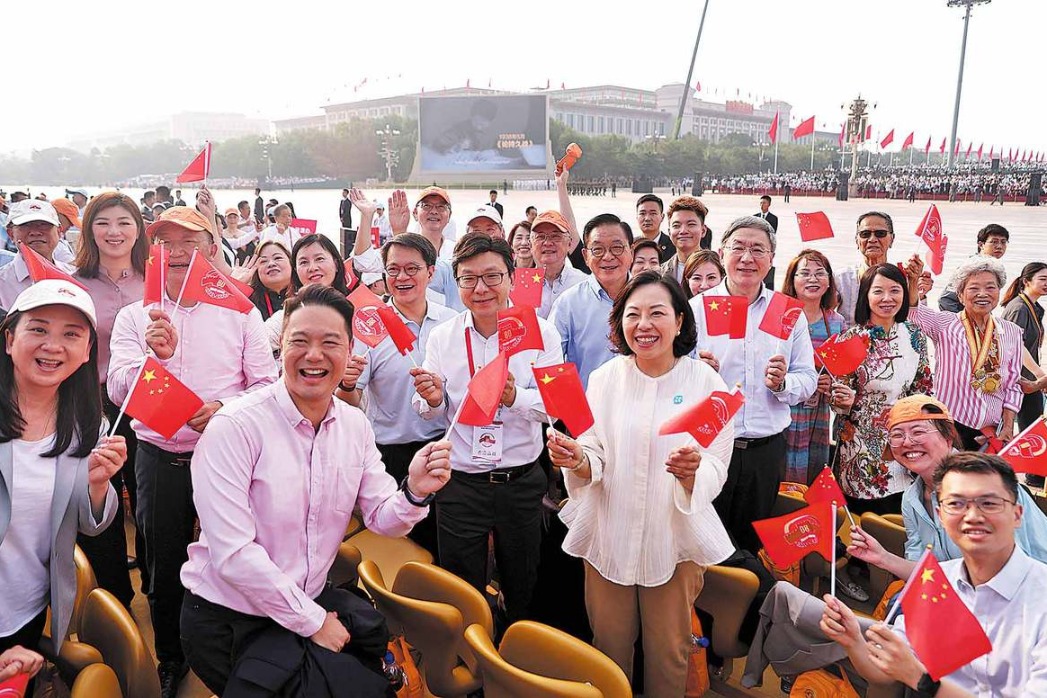HKSAR to march on as a global fintech, trading hub


Hong Kong's economic potentials at the national level have again won recognition under the 14th Five-Year Plan (2021-25) for National Economic and Social Development and the Long-Range Objectives Through the Year 2035.
The outline of the nation's latest economic blueprint pledged to continue supporting Hong Kong in lifting its status as a global financial, transportation and trade center. As I've mentioned several times, economic diversification is certainly a key component of sustainable economic development in Hong Kong and elsewhere, and deeper economic integration with the Chinese mainland is the basis for guaranteeing the city's present and future success.
The past two years haven't been easy for the special administrative region, with 2019 turning out to be one of its most traumatic periods because of the civil unrest. And 2020 and this year haven't been any easier either because of the COVID-19 pandemic.

While the SAR has benefited for decades as the gateway to the mainland, its role as such has diminished, given the gradual opening-up of the mainland economy. Nevertheless, it doesn't mean it won't have an important economic role to play in future. It's quite the opposite.
Despite the challenges, Hong Kong is as strong as ever. In March, the SAR was ranked among the world's top four financial hubs, according to the 29th Global Financial Index.
Hong Kong's future is not so much about remaining as the gateway to the mainland but mostly about keeping and enhancing its current status as one of the world's most important financial centers by adopting the very economic initiatives that are relevant to the development blueprint for the Guangdong-Hong Kong-Macao Greater Bay Area.
Hong Kong will benefit tremendously from participating in the Greater Bay Area's development, which involves the Hong Kong and Macao SARs, plus nine municipalities in Guangdong province. The Greater Bay Area, dubbed "China's answer to Silicon Valley", has a combined population of more than 72 million and a total GDP of $1.8 trillion (comparable to that of the Tokyo Bay Area and the New York metropolitan area).
From its involvement in the Greater Bay Area, Hong Kong will reap the benefits from different projects and initiatives:
Firstly, the Wealth Management Connect Scheme. China's regulators announced on May 6 new draft rules for the cross-border Wealth Management Connect Scheme. It provides a 150 billion yuan ($23.29 billion) quota ceiling for both southbound and northbound trading under the pilot program, a move that will quite likely accelerate the timing of its official launch. Market participants believe the program will kick off once normal travel between Hong Kong and the mainland resumes.
This follows the joint announcement on June 29 last year by the People's Bank of China, the Hong Kong Monetary Authority and the Monetary Authority of Macao on the start of the cross-border wealth management connect pilot program.
The plan is aimed at reducing cross-border restrictions for more than 72 million Greater Bay Area residents in investing in wealth products, such as mutual funds, amid an expected increase in the number of millionaires in the region with an estimated $1.8 trillion in output. The Wealth Management Connect Scheme marks another milestone in the mainland's capital account liberalization and cooperation between Hong Kong and the mainland after the stock and bond connects.
About one-third of Hong Kong-based fund managers expect assets owned by mainland investors under their management to grow by 30 percent between now and 2025, according to a survey by the Hong Kong Investment Funds Association and KPMG.
Given the current economic situation, the Wealth Management Connect Scheme comes at a very opportune time.
Secondly, the parallel development of financial technology on the mainland and in Hong Kong. The nation's 14th Five-Year Plan will center on technological innovation (hence the importance of fintech), a cleaner environment and economic self-reliance.
The South China Morning Post issued China Fintech Report 2020 late last year, providing an in-depth analysis of how the sector is developing rapidly on the mainland. According to the report, nearly 90 percent of Chinese consumers use fintech to pay for almost everything in their daily lives, while most small and medium-sized enterprises use it in running businesses cost-effectively.
Can Hong Kong play a vital role in the mainland's fintech growth? It's just a matter of time since the city has been developing itself into a leading fintech hub. Ernst & Young reported that Hong Kong had a 67 percent consumer fintech adoption rate as of 2019 - a sharp 32 percent increase from the previous two years.
If Hong Kong is to maintain its status as an international banking and financial pivot, it'll need to embrace new industry technologies. It's already on track turning itself into a leading fintech hub. And it has the potential to develop much faster now if it can leverage its involvement in the Greater Bay Area development. Changing consumer behavior brought by COVID-19 also helps.
We can definitely expect positive symbiotic fintech development both in Hong Kong and on the mainland. This can only bring both sides closer together in their parallel development.
Apart from the Greater Bay Area, Hong Kong can benefit from other economic initiatives, such as green finance, as I mentioned in "Hong Kong rightfully becoming a green finance hub" (China Daily Hong Kong Edition, April 23). Since Hong Kong's priority right now (and, to some extent, opportunity) is to mitigate the pandemic's economic effects, one of the many possible ways of doing it would be to embrace green finance even more. In so doing, Hong Kong would be consistent with China's goal to reach its carbon emissions peak before 2030 and become carbon neutral before 2060, as listed in the 14th Five-Year Plan.
Therefore, tapping into green and sustainable finance is not only beneficial to Hong Kong, but also consistent with the nation's objective of paying enormous attention to sustainability and climate change.
Through the 14th Five-Year Plan, China has again recognized Hong Kong's potential at the national level and has reaffirmed its commitment to support the SAR in order to strengthen its position as an international financial, transportation and trade hub. Hong Kong can leverage many initiatives in pursuing deeper economic integration with the mainland, while maintaining and enhancing its status as one of the world's most important financial centers. Now that the Greater Bay Area development has taken off, young Hong Kong people should be more open to the idea of studying, working, and starting businesses in the nine mainland-city cluster, especially Shenzhen.
The views do not necessarily reflect those of China Daily.
- China achieves scientific literacy target ahead of schedule
- Discover the real China
- China-SCO Science-Technology Innovation Cooperation Center unveiled in Qingdao
- Taiwan people express pride after parade
- Documentary spotlights a daring World War II rescue operation in Hainan
- Buddhist body backs Shaolin Temple's former abbot's investigation





































